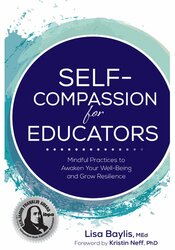Self-Compassion in Our Most Difficult Moments
Free Worksheets to Help Educators Practice Mindfulness & Self-Compassion

I love teaching mindfulness to students. For years, I made an effort to introduce an eight-week mindfulness course to every ninth grader at my school.
One day I showed up and was feeling weary and low. My son was home sick from school, my daughter was in daycare (and I was sure she was coming down with something), and my husband and I had had a fight that morning. I wasnŌĆÖt feeling emotionally or physically well. I was also at a point in my career where many things were hard for me: I wasnŌĆÖt sure I was effectively helping students, I felt like I was working too much, and I wasnŌĆÖt creating the impact in my school that I wanted to. I was on the verge of burning out.
Although teaching mindfulness to students usually made me feel better, that morning, I led a group of students who werenŌĆÖt receptive to mindfulness ideas. They were challenging me on lots of practices. When I shared about an upcoming mental health event I was hosting away from the school, one particular student asked, ŌĆ£Will you be there?ŌĆØ I was taken aback and replied, ŌĆ£Of course. Does that matter?ŌĆØ to which he cruelly replied, ŌĆ£It sure does. No one wants to go if youŌĆÖre there.ŌĆØ
I could feel the tears of rage and hurt come up, but instead of crying in front of this classŌĆöremember, I wasnŌĆÖt at my baseline of being well and was cusping on burnoutŌĆöI walked out. I left the classroom. I left that student, as well as all the other students who were in shock that he had just said this to me...and more in shock that I was on the verge of tears.
Have you had a moment like this in your career? Where you just walked out of your classroom? Or perhaps you stayed and ended up in tears. Have you had days where, intentionally or not, your students hurt you? YouŌĆÖre not alone if youŌĆÖve ended up in tearsŌĆöexhausted and wearyŌĆöat some point in your career. This happens to too many educators, leaving them feeling embarrassed and angry and wanting to leave the profession.
Over this series of blog posts, I will share highlights from my book Self-Compassion for Educators, which will provide you with the tools and practices to understand why we need to focus on educators if we want to see student well-being increase. Many of us know that self-care is an integral part of our well-being, but is it enough? And how can we care for ourselves when we may be barely functioning at school, in our classrooms, and sometimes even at home? Why are these conversations so meaningful right now?
Here we will examine the concepts of stress, burnout, and compassion fatigue as the main struggles for educatorsŌĆÖ individual well-being. We will also realize that we are not alone in these challenges and there is a collective movement that needs to happen to care for us all.
To help you practice self-compassion, even in the moments when it's most challenging, I'm offering .
These simple exercises are perfect for moments when you feel stressed or frustrated. They encourage mindful awareness and self-compassion, so you can navigate your most difficult moments without being overwhelmed by them.
To learn more about the importance of self-compassion and get another free exercise from my book, I hope you'll read my next blog: The Necessity of Self-Compassion for Every Educator.
One day I showed up and was feeling weary and low. My son was home sick from school, my daughter was in daycare (and I was sure she was coming down with something), and my husband and I had had a fight that morning. I wasnŌĆÖt feeling emotionally or physically well. I was also at a point in my career where many things were hard for me: I wasnŌĆÖt sure I was effectively helping students, I felt like I was working too much, and I wasnŌĆÖt creating the impact in my school that I wanted to. I was on the verge of burning out.
Although teaching mindfulness to students usually made me feel better, that morning, I led a group of students who werenŌĆÖt receptive to mindfulness ideas. They were challenging me on lots of practices. When I shared about an upcoming mental health event I was hosting away from the school, one particular student asked, ŌĆ£Will you be there?ŌĆØ I was taken aback and replied, ŌĆ£Of course. Does that matter?ŌĆØ to which he cruelly replied, ŌĆ£It sure does. No one wants to go if youŌĆÖre there.ŌĆØ
I could feel the tears of rage and hurt come up, but instead of crying in front of this classŌĆöremember, I wasnŌĆÖt at my baseline of being well and was cusping on burnoutŌĆöI walked out. I left the classroom. I left that student, as well as all the other students who were in shock that he had just said this to me...and more in shock that I was on the verge of tears.
Have you had a moment like this in your career? Where you just walked out of your classroom? Or perhaps you stayed and ended up in tears. Have you had days where, intentionally or not, your students hurt you? YouŌĆÖre not alone if youŌĆÖve ended up in tearsŌĆöexhausted and wearyŌĆöat some point in your career. This happens to too many educators, leaving them feeling embarrassed and angry and wanting to leave the profession.
Over this series of blog posts, I will share highlights from my book Self-Compassion for Educators, which will provide you with the tools and practices to understand why we need to focus on educators if we want to see student well-being increase. Many of us know that self-care is an integral part of our well-being, but is it enough? And how can we care for ourselves when we may be barely functioning at school, in our classrooms, and sometimes even at home? Why are these conversations so meaningful right now?
Here we will examine the concepts of stress, burnout, and compassion fatigue as the main struggles for educatorsŌĆÖ individual well-being. We will also realize that we are not alone in these challenges and there is a collective movement that needs to happen to care for us all.
To help you practice self-compassion, even in the moments when it's most challenging, I'm offering .
These simple exercises are perfect for moments when you feel stressed or frustrated. They encourage mindful awareness and self-compassion, so you can navigate your most difficult moments without being overwhelmed by them.
To learn more about the importance of self-compassion and get another free exercise from my book, I hope you'll read my next blog: The Necessity of Self-Compassion for Every Educator.
Get more simple, accessible, and easy-to-use practices

There has never been a time in history when educators have felt such overwhelming levels of stress, burnout, and exhaustion. Still, we depend on teachers to be a positive guiding force in our childrenŌĆÖs lives - often playing simultaneous roles as educator, parent, mental health counselor, and caring friend. For educators to fulfill these vital roles, itŌĆÖs abundantly clear that they need to develop resiliency both inside and outside the classroom.
Written by fellow educator and mindful self-compassion expert, Lisa Baylis, MEd, this book provides educators with simple, accessible, and easy-to-use practices that will inspire them to care for themselves - instead of adding to their chaos - so they can continue doing the profession they love.
Within Self-Compassion for Educators, busy and overwhelmed teachers can learn how to:
Written by fellow educator and mindful self-compassion expert, Lisa Baylis, MEd, this book provides educators with simple, accessible, and easy-to-use practices that will inspire them to care for themselves - instead of adding to their chaos - so they can continue doing the profession they love.
Within Self-Compassion for Educators, busy and overwhelmed teachers can learn how to:
- Reduce feelings of shame, criticism, and self-doubt
- Anchor themselves to the present moment
- Develop greater compassion for themselves and others
- Mitigate the effects of chronic stress and develop resilience
- Cultivate a sense of gratitude
- Practice self-care routines that create sustainable well-being
- Avoid exhaustion and burnout
Meet the Expert:
Lisa Baylis, MEd, has been sharing wellbeing strategies for the last 20 years. A natural-born connector with an innate ability to make people feel valued and heard, she is a teacher, school counselor, facilitator, and mother. Trained by mindful self-compassion pioneers Chris Germer and Kristin Neff, Lisa is also a certified mindful self-compassion (MSC) teacher. Her accessible and inclusive presentations have built her a reputation as one of the most trusted self-compassion experts for educators in North America.
Learn more about their educational products, including upcoming live seminars, by clicking here.
Learn more about their educational products, including upcoming live seminars, by clicking here.



